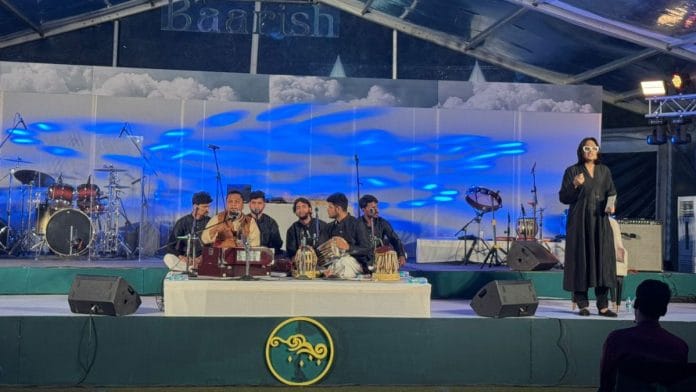New Delhi: A riddle set the tone for an evening of poetry, celebrating the magic of the monsoon. “It’s invisible, but it’s called tender. It makes you sad, but you’re still laughing,” said historian and host of the gathering, Eric Chopra, at the Travancore Palace on 26 July.
“Tickling,” someone shouted in the audience, drawing laughter from all around. Aptly called Baarish, the event sought to bring Megh, or the rains, to guests through storytelling, art, food, and live music. With tickets priced at Rs. 5,600, Delhi’s high society gathered in their finery to soak in tales and poems on love and separation.
Baarish is a monsoon-themed event series, with its first chapter held on 21 June and the second on 26 July. This time, the audience was hooked on stories of the soulful bond between Amir Khusrau and Hazrat Nizamuddin. It was followed by folk music by a Rajasthani band, Barmer Boys.
Eric Chopra, through the stories of Khusrau and Auliya— peppered with qawwalis by the band Rehmat-e-Nusrat – took the audience through the mystical heart of Delhi. It made the sham-e-ghazal (evening of ghazal) both relatable and exciting for the audience.
Taking a cue from the old mehfils of Delhi, Chopra brought forward some prominent ghazals and qawwalis. Soon, the audience was swaying and dancing to a performance by Rehmat-e-Nusrat’s lead singer, Sarabjeet.
But this is not a new form of storytelling, he said.
“It is an old tradition within mehfils and within the storied past of Delhi to give nuance to whatever you are performing. So, when you know the context, your experience overall with that music becomes more powerful,” said Chopra.
Khusrau and Hazrat
Khusrau came from high society – from the world of politics and power. On the other hand, Hazrat Nizamuddin Auliya belonged to the spiritual world. Yet the story of one is incomplete without the other.
Once, Jalaluddin Khilji told Khusrau that he wanted to meet his spiritual master, Hazrat Nizamuddin Auliya — but made him promise not to inform the saint in advance.
“But Khusrau was loyal,” said Chopra. “So he went straight to Hazrat Nizamuddin Auliya and said, ‘Khilji is coming to meet you.’ Auliya left his place.”
Whenever Khusrau would come to the khanqah of Hazrat Nizamuddin Auliya, the saint would recline on his seat and say, “So, Khusrau, tell me — what’s going on in Delhi’s high society?”
The bond between disciple and seer was strong and immune to the whims of politics and power.
Each time Khusrau was away from his master’s side, he became what is called in the Indic tradition — a virahin (lonely), said Chopra.
And then he asked the audience, “Do you know what virah is?” When no one responded, he said, “It’s the fire of separation.”
Khusrau was burning with the pangs of longing. And perhaps in that very distressing state, he once said: “Don’t be heedless of my sorry state.
But I cannot bear this separation.”
Also read: ‘Hindi Heartland must learn manners to preserve India,’ says Manoj Jha at Delhi book launch
‘I’ve met my beloved’
It was in 1290, said Chopra, during the reign of Jalaluddin Khilji, when Khusrau first laid eyes on his spiritual master. He realised that Auliya was his only true love. And what followed was surrender. With that little vignette, Chopra broke into verse.
Khusro, I play the game of love with my beloved.
If I win, the beloved is mine.
If I lose, I am the beloved’s.
But like every good story must come to an end, so did the event — though not without leaving something behind for the curious audience, still eager to know more about the Khusrau-Auliya bond.
In 1325, Hazrat Nizamuddin Auliya called for Khusrau and asked him to pray — saying he wouldn’t be able to survive without him. It was almost a prophecy.
Khusrau was in Bengal when he received news of his master’s death. He left everything and returned to Delhi. Within six months, Khusrau also died.
Chopra turned to his audience and asked them to imagine their meeting on the other side. What would Khusrau have said?
“There is colour today, mother — colour everywhere!
At my Khwaja’s house, there is colour!
I’ve met my beloved, I’ve met my beloved!”
(Edited by Ratan Priya)






